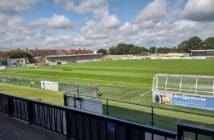
Billingham’s ground at Central Park had one of the biggest stands in non league football
The North-Eastern part of England has always been heavily associated with the coal industry. Whereas in Wales collieries were associated with male voice choirs, in the north east they have been associated with brass bands and orchestral music.
But if you thought Billingham in County Durham had a football club called ‘Symphonia’ connected in some way with its musical heritage, you’d be wrong.
Oh so wrong.
The Northern League Division 2 club is named Synthonia not Symphonia and its name comes from an altogether different industrial source.
Established in 1923, Billingham Synthonia was named after an agricultural fertiliser called ‘synthetic ammonia’. The name Synthonia was created as a combination of the two words and adopted by the town’s football and cricket clubs. It is also (at least to our knowledge), the only club name to be named after a fertiliser!
And whereas there a few clubs nicknamed the Saints, they are the only one we can trace nicknamed the Synners.
Synthetic ammonia (ammonia that has been synthesized) was a product manufactured by ICI who, back in the day, were affiliated with the club. The industrial conglomerate ICI remained a key club partner for decades. The club in fact originally played at the Belasis Lane ground on the ICI complex.
The Belasis gained some footballing fame on 11 November 1952 as home to the first ever floodlit game in northern England when Billingham defeated an Air Force team 8–4 in front of a crowd of 3,000.
The ability to inspire words took on an altogether more literary turn when author Aldous Huxley visited the town. Huxley worked and lived there for a short time as a young chemist before Brunner and Mond became ICI, but is said to have hailed Billingham as “an ordered universe in a world of planless incoherence” and as “magnificent poem”.
The intended purpose for his visit was the newly opened and technologically advanced Brunner and Mond plant which predated ICI.
His time there inspired his greatest and one of the English language’s greatest modern works. In the introduction to the most recent print of Brave New World, it states that Huxley was inspired to write the novel by his time in Billingham.
Huxley was not the only lyricist to be inspired by Billingham.

Photo: http://republic-of-teesside.blogspot.com/
Henry Thorold, writing in the Shell Guide to County Durham states:
“This is one of the most extraordinary of experiences, a sight almost unique in England. On either side of the road are the works. Steaming, sizzling – tall steel towers, great cylinders, pipes everywhere.
“At night the whole industrial world along the banks of the Tees comes to life… brilliant with a thousand lights, the great girders of the Transporter Bridge dark in silhouette: a magic city.”
Pride in the town is matched by pride in its uniquely named football club. The website, People’s Republic of Teesside, claims that Billingham Synthonia is the “most imaginative name for a non league football club”.
Synners played at the Belasis until 1958 when they moved to Central Avenue in Billingham. The inaugural game ended in a 2–2 draw against Bishop Auckland attracting a crowd of 4,200 still the club’s record attendance. The stadium also hosted Middlesbrough reserve matches until 2011.
The club was in dire trouble at the start of the 10s decade. Their financial saviour also had a Boro connection. Jamie Pollock played 155 games for the Smoggies between 1990 and 1996 before starring for Bolton. Manchester City and Crystal Palace. He stepped in to keep them afloat later becoming chairman in 2018.
Unfortunately nothing could be done to keep the ground going and the club now has a temporary lease playing a few miles away at the Norton and Stockton Sports Ground.

Synthonia are now at the Norton Stadium in Stockton which they share with the Norton Women’s team Photo: Norton & Stockton Ladies
The Central Park ground was famous amongst non league clubs for having one of the biggest stands in non league football (see photo at top).
Pollock is now working with head coach Dave Dickson to pull in the funds to enable the club to move back to Billingham within two years.
Dickson told Prost International:
“It is essential for the team to return (to Billingham) as we are not achieving the crowds we need to move the club forward where we currently play.
“The club is steeped in history and our centenary year comes up in 2023. It is our desire to have us playing back in Billingham by this time, in a stadium that can facilitate a significant rise up the ninth league pyramid.”
Pollock won Championship titles with both Boro and Bolton so is no stranger to achieving his footballing goals. Whether his Synners will see their centenary in Stockton or whether it will usher in a ‘Brave New World’ in Billingham, remains to be seen.
It’s a pity the prize for this best non-league names tournament cannot be as simple as a lease and a set of keys.
Best non-league names articles
![Prost International [PINT]](https://prostinternational.com/wp-content/uploads/2021/08/PINTtFontLogoRoboto1536x78.jpg)


